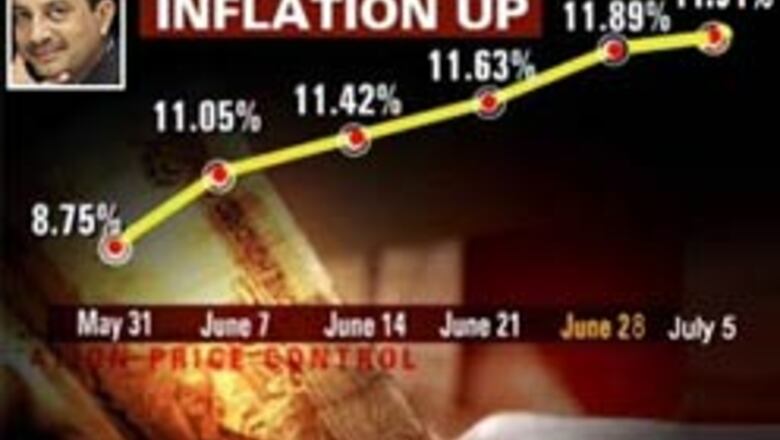
views
Inflation figures just keeping get worse: it is now at the 11.91 per cent mark for the week ended July 5, the highest in thirteen years. The Government, which is preparing for a crucial vote of confidence in Parliament next week, says it is all doing it can and blames global forces outside its control for the inflation. Is inflation in India out of control? How will it impact the common man? And what exactly is inflation? Vivian Fernandes, Economic Policy Editor of CNBC-TV18, explained the jargon and the economics to IBNLive readers in web chat.
Gemini: Can you please explain what is inflation?
Vivian Fernandes: Inflation is a measure of price rise. The common measure we use in India is the Wholesale Price Index (WPI). It is not an accurate measure of the rate of price rise that you and me experience as consumers because it measures price rises at the input, intermediate and final goods stages while we are concerned with consumer price inflation. There are four consumer price indices, for industrial workers, urban white-collar employers, agricultural workers and rural labour. But these come once a month, which is why the weekly WPI catches the headlines.
Nitin: Why do we use WPI to measure inflation not the consumer price index (CPI)?
Vivian Fernandes: WPI is announced weekly by the Department of Industrial Policy and Promotion, which is why it catches the eye quickly. Consumer prices indices are released monthly. But I agree with you that WPI is not an accurate measure of consumer price inflation, because some of the cost increases may not be felt in the final consumer goods (producers might decided to absorb them by taking a hit on their profits).
Ramakrishnan: China, which has similar problems like rapid growth, high energy dependency and more than a billion mouths to feed, has succeeded in taming inflation and its down to 7.1 per cent. India is still not even talking of inflation cooling down. If China can do it why was not it not possible for India to do it?
Vivian Fernandes: I am not very familiar with the Chinese situation but let's not forget that it is the low cost workshop of the work and is not constrained by infrastructure bottlenecks like power shortages. So China can increase capacity to meet rising demand. But China also increased fuel prices recently by 18 per cent. In India, every fuel price hike is met with a hue and cry. That said, one should not look at only the headline inflation number which today is 11.91 per cent. If you deconstruct the inflation numbers, you will find that week on week inflation in the case of primary articles and essential commodities has declined. The Finance Ministry says of 320 manufactured items, 281 have seen a price increase.
N Anand Rao: Is India going to have an Argentina like situation: high inflation, poor rains, bad crops and an unstable political situation?
Vivian Fernandes: We have never been profligate like Argentina. Inflation is high no doubt, but I do not agree about the other three aspects. Rains are normal, we have a record harvest and though the government is fighting for its survival, we cannot say the political situation is unstable.
Sreenivas: Don’t you think that the main reason for inflation is because of we adopting an American model of development or Russian model of development instead of an Indian model for development?
Vivian Fernandes: No, this has nothing to do with development models. The inflation that we experience is imported inflation, because global commodity prices are on the upswing, whether of metals, minerals, oil or food products. In fact, food price inflation in India is lower than elsewhere in the world. Steel prices domestically are also lower. Diesel, cooking gas and kerosene prices are less than what the market would charge.
Shankar Krishnan: Can India's foreign reserves be used to reduce inflation/oil prices as Amar Singh has suggested? Has the Reserve Bank of India/Finance Ministry considered this option seriously?
Vivian Fernandes: Amar Singh’s suggestion would help contain inflation because it would lower the prices of imported stuff like oil, but it would impact the labour-intensive export industry like textiles. So the Government has to strike a balance between jobs and low prices.
Sandeep Kumar Verma: How is inflation in India is related to crude oil price?
Vivian Fernandes: Petroleum is used not only as fuel but also as a key raw material for a host of products, like plastics and polymers. So a rise in crude prices has an impact across the economy. The Government only controls the prices of petrol, diesel, cooking gas and kerosene. Prices of jet fuel, naphtha and furnace oil are market-determined. Which is why airlines are facing a big loss and the cost of manufacturing has risen.
PAGE_BREAK
Bala: Why rentals and healthcare have been made out of reach? Why are we importing many items rather manufacturing here? Has the Government willingly not taken action against over speculation in the past few years?
Vivian Fernandes: Rentals and private healthcare fees are not regulated by the government. When there are expectations of prices rising, the people who provide these services like housing and healthcare, that we cannot do without, pass on their costs, and a little more, to those that need them. Rentals will rise where housing demand cannot be easily expanded, as in Mumbai. Government healthcare can play a moderating influence if it is easily accessible, or comparable quality. In India this is not the case.
Sreenivas: Don’t you think that the previous NDA government was much better of than the present government of an economist Prime Minister?
Vivian Fernandes: You cannot compare because the economic situations were not comparable. But I think the NDA government was able to raise fuel prices more often than the UPA government did. That is because former Petroleum Minister Mani Shankar Aiyar messed up the opportunity provided by a cabinet decision to quietly raise prices within a band. The Left parties would not allow a price increase. Congress President Sonia Gandhi herself was also not in favour. I think the UPA government did not make use of the feel-good factor in the first four years to pass on fuel price hikes, in the hope that crude prices would not cross $100 a barrel. It was the triumph of hope over experience.
Raguraman M: Do you feel that some of the decisions taken by the Government, like farm loan waiver and not having a proper mechanism to manage fuel price hike, have contributed more to high rate of inflation?
Vivian Fernandes: If fuel prices were raised in a calibrated manner, we would not seen the current surge. The loan waiver has increased the government's liabilities. I do not agree with the loan waiver, but I feel that farmers are being squeezed to keep prices in check. There is a hue and cry when, say, steel or cement exports are banned. But there is not a squeak when rice or cotton exports are banned. If farmers cannot get the right rates, they will not be able to service loans, and safety nets like farm loan waiver will become necessary.
Malik: Do you think that the Congress has failed in controlling inflation and can the next government control inflation?
Vivian Fernandes: If the Congress has failed to control inflation, it is not for want of trying. I do not think another government in its place, might have been able to do a better job. The next government might find the situation favourable. Since inflation is measured year on year, because of the high base effect, if nothing else, inflation is expected to fall the next year.
Nagarajan: At this moment inflation is not India specific. Other countries are also in the same boat. Weekly budget of the families in the UK has shot from £100-118 to about £800 annually. Can present or any other government in India bring down the inflation?
PAGE_BREAK
Vivian Fernandes: If oil prices remain at current levels, economic activity will slow down. That will impact demand and prices. Which is why when US Federal Reserve Chairman Ben Bernanke said that inflation was exacting a toll on the US economy, crude prices dropped by six dollars to $132 a barrel, the steepest decline in 17 years.
Bjayachanderrao: Inflation is rising and is seen to be heading towards 14-15 per cent in near term. Do you think such a high level of inflation sustainable in our economy? And what will be the impact of this on our stock market?
Vivian Fernandes: I think it is hard to predict where inflation is headed, because one never knows where crude prices will settle. For now, inflation seems to have stabilised at 11.91 per cent for the week ending July 5, from 11.89 per cent the previous week. Why expect the worst.
G K Kashyap: What will be the impact of inflation on banks and in turn how will it impact home loan rates, the real estate sector? When do you see the interest rates stabilising
Vivian Fernandes: Home loan rates have risen by half percentage points. The real estate sector has taken a hit. The RBI has told a committee of MPs that it does not see inflation in the comfort zone before six month.
Pravin Luharuka: I want to know if the recent surge in oil prices is because of speculation or demand supply crunch?
Vivian Fernandes: OPEC, the oil producers cartel, says the price rise is because of rising demand, but Finance Minister P Chidambaram told oil ministers in Jeddah last month, that much of it is on account of speculation. The US is printing money to boost its economy. The supply of dollars is plentiful, but oil production capacity cannot be expanded. One reason for the rise in crude is the falling value of the dollar. A lot of money that would have gone into stocks is now getting into commodities. So there is a big element of speculation.
Maalolan Ramanujam: Do you think the Government should consider reviving the oil pool account? If it had not closed, we can have some control over the surging oil prices. I feel the increase in oil prices has a direct impact in the inflation rate. Kindly explain?
Vivian Fernandes: The oil pool account does not help control oil prices, which are determined externally. The oil pool account is a way of cross-subsidising, which is happening even now. ONGC and Oil India Ltd are bearing a part of the subsidies, some of them are being absorbed by the oil marketing companies, or passed on to other consumers, like that of jet fuel. Consumers are bearing a part of the crude price hike.
Jaikrishna: Though fuel price hike could have been controlled and moderated in a better manner, diesel is still heavily subsidized, I understand that increasing this will impact consumer products heavily but with almost everybody changing to diesel four wheelers don't you think the government is incurring heavier losses and how do you think this can be controlled?
Vivian Fernandes: The conventional view is that an increase in prices of diesel will help conserve the fuel. But Subir Raha, the former chief of ONGC, tells me that ours is a genset economy, because we have not invested in power capacity. So hiking diesel prices will not help check consumption over much. Farmers have to use diesel for their pumps, as there is no good rural power supply. Raising diesel prices will hurt this politically-sensitive community and this in turn, is helping, the people who should not be subsidised, the guys who buy diesel-fuelled luxury cars and SUVs.
PAGE_BREAK
Shravan: Do you think once this economic crisis is over India might emerge stronger? If so what exactly India should do to emerge stronger? Reforms?
Vivian Fernandes: It will help companies trim costs. I remember in the mid-nineties interest rates were very high. I took a home loan at 15.5 per cent. Small and medium enterprises were borrowing at as high at 18 per cent. That persuaded them to be more efficient users of capital.
Ronal: The US demand of crude is diminishing due to deepening recession and China's demand is not increasing substantially to be construed as "surge", then what could be reason for the crude to enjoy such an exorbitant price?
Vivian Fernandes: The United States has pumped in a lot of dollars to boost its economy. Also, scares like Iran firing missiles, the fear that Israel will attack Iran's nuclear installations, all these raise apprehensions that oil supplies will be interrupted. This has an impact on prices.
Mitesh: The RBI hikes the price but banks—mainly private—provide more discount to catch new customers. Don't you think that this not only helps maintaining the demand for real estate and thus continuing inflation and at the same time hurting common man both way as his cost of living go up and pays more interest?
Vivian Fernandes: For some time, even public sector banks did exactly this. The RBI would signal a hike in interest rates, to check inflation, but the Finance Minister, who is more concerned about maintaining growth, would talk them out of it. Which is why, the RBI has had to resort to raising both CRR and the repo rates recently.
Ankur Saxena: Do you see the realty rates falling in near future as the high interest rate will surely dampen mood for buying homes?
Vivian Fernandes: I think so; realty prices should fall. I hope you have spare cash to invest!
Raguraman M: Does the sub-prime crisis in the US has started affecting the global economies and is it in anyway contributing to high inflation rates?
Vivian Fernandes: The sub-prime crisis has resulted in an economic slowdown in the US. The resultant effort to boost the economy has led to a rise in money supply, and inflation.
Jonathan: How much is the foreign exchange reserve a cushion for India in this current inflation scenario?
Vivian Fernandes: There are enough reserves. The question is whether the government is willing to use them.
Ronal: Is petrol in India really subsidised?
Vivian Fernandes: Really speaking, petrol in India is not subsidised. Petrol costs $4 dollars a gallon in the US, which is slightly less than the price we pay. And US consumers pay market prices. Diesel prices in the US are about the same as petrol, but in India they are much lower. However, petroleum products are an important source of revenue for the government. If it does not tax them it will have to find alternate sources of taxation.
Bhaskaran: Don't you think the inflation figures are being manipulated by Government, while there is a feeling that the prices of food are spiraling every week, the Government in its release says certain food prices are down. Don't you all think one of the major factors of inflation is indulging in superfluous development rather than development in respect of quality of life.
Vivian Fernandes: If they were manipulated, the government would not have been on the defensive.
Harish: My suggestion to control inflation is exporters (IT companies) and importers (oil companies) should sign a MoU to keep dollar at a stable rate for a year. So it’s a win-win situation for both against dollar instability. Is it feasible?
Vivian Fernandes: This is an impractical suggestion.
(Vivian has been with CNBC for the past 14 years and covers the central ministries and Parliament. He has an abiding interest in public policy. )



















Comments
0 comment